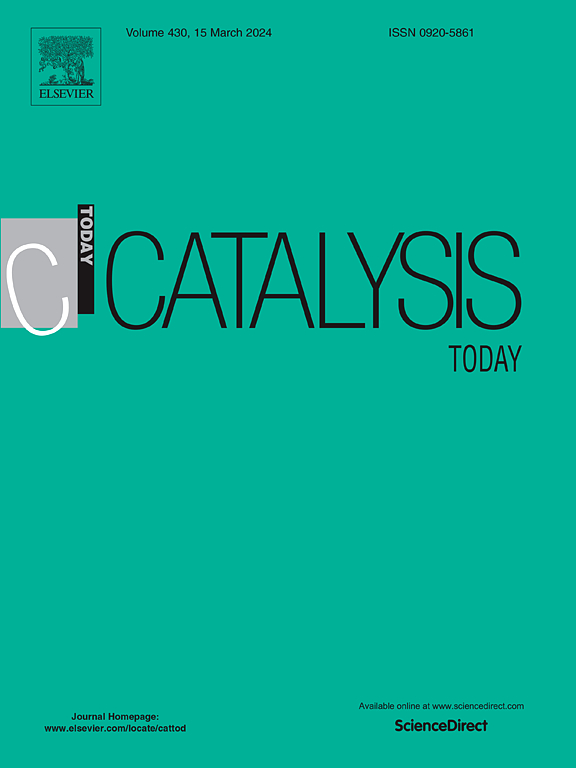CO2 hydrogenation to methanol over CeO2-ZrO2-supported Cu-Ga catalysts: Influence of catalyst composition on catalytic performance
IF 5.3
2区 化学
Q1 CHEMISTRY, APPLIED
引用次数: 0
Abstract
To address the challenges posed by the greenhouse effect and climate change, and to achieve carbon neutrality, the hydrogenation of CO2 into methanol (CH3OH/MeOH) has gained significant attention due to its utility as a fuel and fuel additive. In this study, we synthesized bi-metallic catalysts based on Ga/Cu supported on ZrO2- and CeO2-based oxides using the wet impregnation method for the direct hydrogenation of CO2 into methanol. The catalyst composition and metal-support interaction (MSI) were identified as critical factors influencing methanol production. Our findings revealed that the appropriate dispersion of metallic particles on the support significantly enhanced both CO2 conversion and methanol selectivity. A synergistic effect was observed for Ga and Cu supported on a CeO2/ZrO2 composite (80:20), achieving highest CO2 conversion of 15 % at reaction conditions of 300 °C and 410 psi. 1Cu1Ga/CZ (80:20) catalyst exhibits durability over 100 hours at 240° C possess 7.2 % conversion of CO2 with 50 % of MeOH selectivity without significant decaying under the pressure of 410 psi and space velocity of 4500 mLh−1g−1. H2-TPR and CO2-TPD analyses indicate that the 1Cu1Ga/CZ (80:20) catalyst exhibits the highest redox activity and CO2 adsorption capacity among all the catalysts tested. Additionally, the study emphasizes the importance of optimizing metal (promoter) loading and support composition to maximize catalytic performance and enhance methanol yield.
ceo2 - zro2负载Cu-Ga催化剂上CO2加氢制甲醇:催化剂组成对催化性能的影响
为了应对温室效应和气候变化带来的挑战,并实现碳中和,二氧化碳加氢成甲醇(CH3OH/MeOH)由于其作为燃料和燃料添加剂的用途而受到了极大的关注。在本研究中,我们采用湿浸渍法合成了基于ZrO2-和ceo2基氧化物负载的Ga/Cu双金属催化剂,用于CO2直接加氢成甲醇。催化剂组成和金属-载体相互作用(MSI)是影响甲醇生产的关键因素。我们的研究结果表明,金属颗粒在载体上的适当分散显著提高了CO2转化率和甲醇选择性。在CeO2/ZrO2复合材料(80:20)上观察到Ga和Cu的协同效应,在300 °C和410 psi的反应条件下,CO2转化率最高达到15%。在410 psi压力和4500 mLh - 1g - 1空速下,1Cu1Ga/CZ(80:20)催化剂在240°C下的耐久时间超过100 小时,CO2转化率为7. %,甲醇选择性为50%,无明显衰减。H2-TPR和CO2- tpd分析表明,1Cu1Ga/CZ(80:20)催化剂表现出最高的氧化还原活性和CO2吸附能力。此外,该研究强调了优化金属(促进剂)负载和支持成分以最大化催化性能和提高甲醇收率的重要性。
本文章由计算机程序翻译,如有差异,请以英文原文为准。
求助全文
约1分钟内获得全文
求助全文
来源期刊

Catalysis Today
化学-工程:化工
CiteScore
11.50
自引率
3.80%
发文量
573
审稿时长
2.9 months
期刊介绍:
Catalysis Today focuses on the rapid publication of original invited papers devoted to currently important topics in catalysis and related subjects. The journal only publishes special issues (Proposing a Catalysis Today Special Issue), each of which is supervised by Guest Editors who recruit individual papers and oversee the peer review process. Catalysis Today offers researchers in the field of catalysis in-depth overviews of topical issues.
Both fundamental and applied aspects of catalysis are covered. Subjects such as catalysis of immobilized organometallic and biocatalytic systems are welcome. Subjects related to catalysis such as experimental techniques, adsorption, process technology, synthesis, in situ characterization, computational, theoretical modeling, imaging and others are included if there is a clear relationship to catalysis.
 求助内容:
求助内容: 应助结果提醒方式:
应助结果提醒方式:


